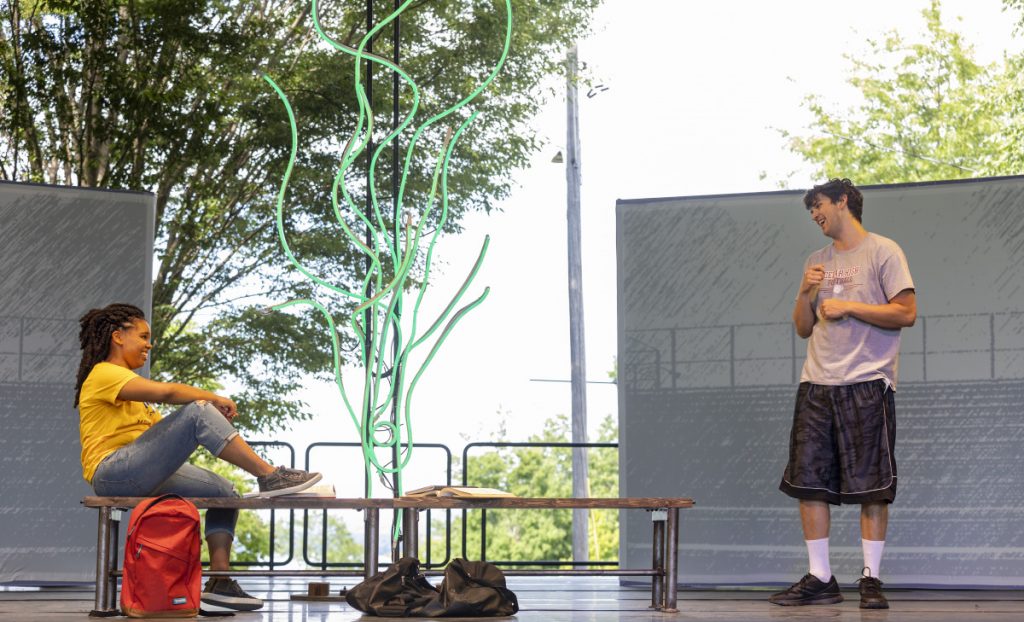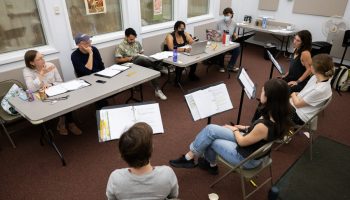DAVID KWIATKOWSKI – STAFF WRITER
“Today gonna mean somethin’ different, y’heard. Today can’t be like no other day. Today gotta count for somethin’.”
– Raylynn, Blood at the Root

As Chautauqua Theater Company concludes its run of Dominique Morisseau’s Blood at the Root at 4 p.m. Sunday, July 18 at the Performance Pavilion on Pratt, the Chautauqua community has been sparked to engage in deeper conversations both in and outside the Institution.
The show is based on the real-life events of the Jena Six in Louisiana in 2006, where a fight at school led to Black teenagers being charged with attempted murder.
Senior Vice President and Chief Officer of Inclusion, Diversity, Equity and Accessibility Amit Taneja is passionate about the play’s themes in relation to the cross-cutting imperative of the 150 Forward strategic plan.
“(Blood at the Root) is living out our mission by bringing some critical dialogue, in conversation by raising important issues that we’re facing as a society,” Taneja said. “I think that has led to conversations on the porch at the dinner tables. It’s really spreading that message out, that these are still issues that we’re living with or dealing with.”
For the last show, the Omega Mentoring Program and the Monarch of Infinite Possibilities are bringing students from Buffalo-area school districts to see the show, as well as Sunday’s Music School Festival Orchestra Chamber Players concert.
The Omega Mentoring Program is a program that mentors youth in Buffalo’s east side.
Faustenia Morrow, the creator of the Monarch of Infinite Possibilities, wants the play to inspire the young people, and show them that their lived experiences are beginning to be understood and showcased on the stage.
“I want the play to move the young people, but the reality is that many of them live this experience on the planet,” Morrow said. “I’m hoping that they will see a response from the audience that shows that people are starting to get it. They live this experience every day, they walk in institutional racism, they walk in spaces where they’re not welcomed, and they walk in spaces where they have to be fearful that they were sitting there going to be shot dead in the street.”
Morrow has visited Chautauqua, and wants the students to feel the same sense of relaxation on the grounds that she has.
“I’m hoping that by coming to Chautauqua, they get a moment to breathe,” Morrow said. “I’m hoping they come to Chautauqua and they walk away like, ‘Wow, I had a chance to just relax, even if it was only for two hours.’ I see Chautauqua as a place to relax and be stimulated.”
CTC Conservatory Actor Malachi Beasley, who portrays Justin in the show, paid a visit to Johnnie B. Wiley Amateur Athletic Sports Pavilion in Buffalo to encourage students in the east side on a path to success.
“I think mentorship, any kind of programming, any person that is there, really helps guide any person, especially someone like me that’s from the hood, that didn’t think there was anyone out there,” Beasley said in an interview with WIVB.
The director of the play, CTC Associate Artistic Director Stori Ayers, originated the role of Raylynn in its original run in 2014 and helped CTC Conservatory Actor Jada Owens find the character.
“Her guidance has benefited me in so many ways,” Owens said. “I will forever be grateful because it just informs how I will take on my acting process moving forward. It has just been a blessing to work with Stori to learn from her, and to just really lean on her for every bit of advice.”
Owens has learned more about her identity as a Black woman while playing this role.
“I think Raylynn has taught me more to be more like her,” Owens said. “I am a very chill kind of Black woman. She’s teaching me to ask more questions, to speak out more. To just dare in ways that it’s risky, but it’s good trouble. Going back to the pandemic and George Floyd, I vocalized on social media for sure, but I never really was a strong vocalist when it came to protesting. I was nervous. I was afraid. I was scared. Raylynn is brave and strong, in many ways that has influenced me to change how I see the world, and how I define relationships in my life.”
A native of New Orleans, Owens does not remember hearing about the Jena Six story because another momentous event was occurring at the same time: Hurricane Katrina.
“(I was) talking to my mom about it,” Owens said. “I didn’t know about it in ‘06 and ‘07 because we were just recovering from Hurricane Katrina.” She said there was not a “deep investment” in the Jena Six case because the city of New Orleans was busy trying to recover.
Blood at the Root touches on issues that go hand-in-hand, not just in Chautauqua County, but in America as a whole.
“It really brings in critical dialogue and deep dialogue that we need to have at Chautauqua to create a more inclusive community and to think about how these issues play out in wider society, in the school system and the criminal justice system,” Taneja said.




